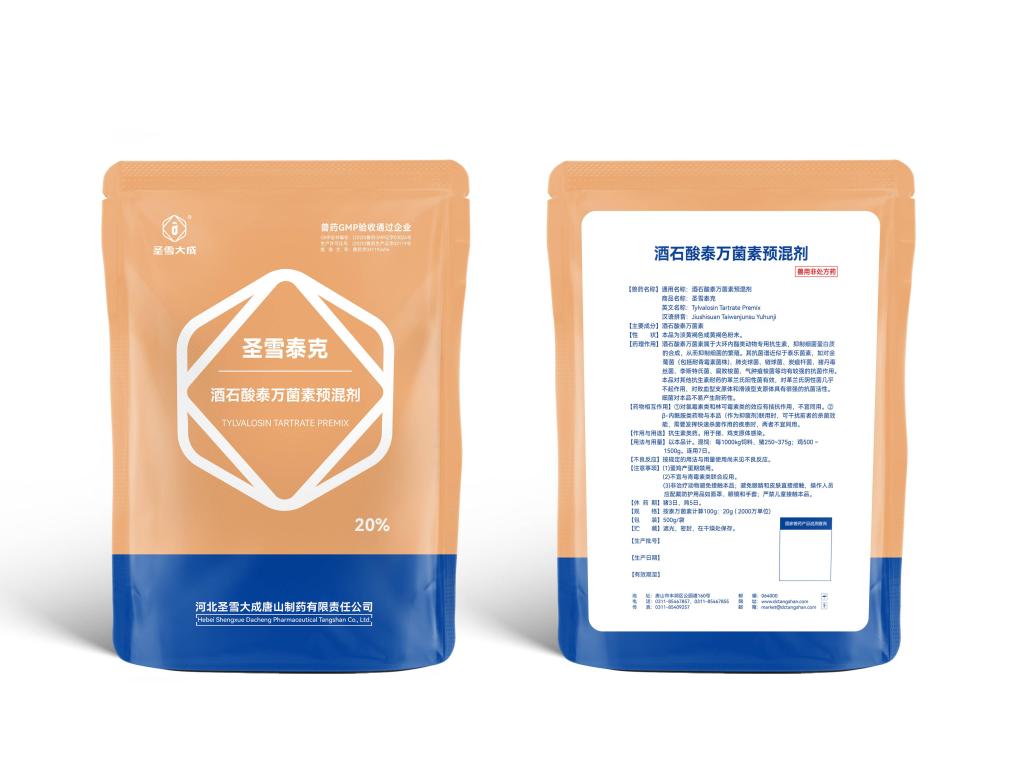Tel:+8618231198596

News
 CONTACT
CONTACT
 CONTACT
CONTACT
- Linkman:Linda Yao
- Tel: +8618231198596
- Email:linda.yao@dcpharma.cn
- Linkman:CHARLES.WANG
- Department:Overseas
- Tel: 0086 0311-85537378 0086 0311-85539701
News
Current Position:
Home >
News
>Tylvalosin tartrate premix reduces disease-related losses for farmers.
Tylvalosin tartrate premix reduces disease-related losses for farmers.
TIME:2024-07-05
Formulation and Administration
Tylvalosin tartrate is commonly formulated as a premix for incorporation into animal feed or water. This formulation facilitates convenient administration to large groups of animals, ensuring consistent dosing and effectiveness. Premixes typically contain a specified concentration of tylvalosin tartrate, ensuring accurate delivery and minimizing the risk of under-dosing or overdosing.
Regulatory Approval and Safety Considerations
Tylvalosin tartrate premixes are approved for use in various countries following rigorous regulatory evaluations for safety, efficacy, and environmental impact. The antibiotic is generally well-tolerated by livestock when used according to label instructions. However, prudent use practices, including adherence to withdrawal periods, are essential to mitigate the development of antimicrobial resistance and ensure food safety.
Role in Reducing Disease-Related Losses
Respiratory Disease Management
Respiratory diseases, such as bovine respiratory disease (BRD) and porcine respiratory disease complex (PRDC), are significant concerns in livestock production. These diseases not only cause morbidity and mortality but also lead to decreased growth rates, reduced feed efficiency, and increased veterinary costs. Tylvalosin tartrate premixes play a crucial role in the prevention and control of respiratory diseases, thereby minimizing production losses and improving overall herd health.
Prevention of Disease Outbreaks
In intensive farming operations, where animals are housed in close proximity, the risk of disease outbreaks is heightened. Tylvalosin tartrate premixes can be incorporated into preventive health management strategies to reduce the incidence and severity of respiratory infections. By enhancing immune responses and controlling bacterial populations, tylvalosin tartrate contributes to maintaining a healthy livestock population and mitigating disease-related economic losses.
Economic Benefits for Farmers
The economic impact of livestock diseases extends beyond direct treatment costs to include reduced productivity, increased labor requirements, and potential losses due to mortality. By effectively managing respiratory diseases, tylvalosin tartrate premixes help farmers maintain optimal production levels and minimize financial setbacks. Improved animal health translates into higher profitability and sustainability for farming operations.
Practical Applications and Case Studies
Dairy Farming
Dairy cattle are susceptible to respiratory diseases, particularly during periods of stress such as calving or transportation. Tylvalosin tartrate premixes have been shown to reduce the incidence of respiratory infections in dairy herds, leading to improved milk production and overall herd performance. Farmers benefit from enhanced disease control and reduced reliance on therapeutic antibiotics, thereby supporting sustainable farming practices.
Swine Production
Respiratory diseases pose significant challenges in swine production systems, impacting growth rates and feed conversion efficiency. Tylvalosin tartrate premixes have demonstrated efficacy in controlling respiratory pathogens in swine herds, resulting in reduced medication costs and improved profitability. Integrating tylvalosin tartrate into swine management protocols helps farmers optimize production outcomes while promoting animal welfare.
Poultry Industry
In poultry farming, respiratory diseases can spread rapidly among flocks, leading to reduced egg production and compromised meat quality. Tylvalosin tartrate premixes offer poultry producers a proactive approach to managing respiratory health, minimizing the impact of diseases such as infectious bronchitis and mycoplasma infections. By maintaining respiratory wellness, farmers can achieve consistent production levels and meet market demands effectively.
Environmental Considerations and Sustainability
Responsible Antibiotic Use
The use of tylvalosin tartrate premixes is guided by principles of responsible antibiotic use to mitigate the development of antimicrobial resistance. Farmers are encouraged to follow veterinary guidance, adhere to recommended dosages, and observe withdrawal periods to ensure the safety of animal products for human consumption. Sustainable antibiotic stewardship practices are essential for preserving the efficacy of tylvalosin tartrate and other antimicrobials in veterinary medicine.
Environmental Impact
The environmental impact of tylvalosin tartrate use in livestock production is a subject of ongoing research and scrutiny. Efforts are directed towards minimizing antibiotic residues in waterways and soil through proper waste management and adherence to regulatory guidelines. Sustainable farming practices, including biosecurity measures and integrated disease management strategies, contribute to reducing the environmental footprint associated with antibiotic use.
Future Directions and Challenges
Research and Innovation
Continued research is essential to optimize the efficacy and safety of tylvalosin tartrate premixes in livestock production. Advances in formulation technologies, dosage regimens, and understanding of microbial resistance mechanisms will support informed decision-making and sustainable use practices. Collaborative efforts between researchers, veterinarians, and industry stakeholders are critical for addressing emerging challenges and enhancing disease management strategies.
Regulatory Landscape
The regulatory landscape governing the use of tylvalosin tartrate premixes continues to evolve, reflecting global efforts to promote responsible antibiotic use and safeguard animal and public health. Harmonized guidelines and standards facilitate international trade while ensuring the safe and effective use of veterinary medicines. Regulatory authorities play a pivotal role in evaluating new formulations, monitoring antibiotic residues, and promoting compliance with best practices among farmers.
Public Awareness and Education
Educating farmers, veterinarians, and consumers about the benefits and challenges of tylvalosin tartrate use is essential for fostering transparency and trust in livestock production systems. Communication initiatives that emphasize responsible antibiotic stewardship, animal welfare considerations, and sustainable farming practices contribute to informed decision-making and societal acceptance of veterinary medicines.
Conclusion
Tylvalosin tartrate premixes represent a valuable tool for farmers in managing respiratory diseases and reducing disease-related losses in livestock production. By leveraging its antimicrobial properties and supporting responsible antibiotic use, tylvalosin tartrate contributes to enhanced animal health, improved productivity, and sustainable farming practices. Continued research, regulatory oversight, and stakeholder collaboration are essential for maximizing the benefits of tylvalosin tartrate while minimizing its environmental impact and promoting global food security. As farmers strive to meet growing demand for safe and nutritious food, tylvalosin tartrate premixes play a pivotal role in ensuring the health and welfare of livestock populations worldwide.
- Tel:+8618231198596
- Whatsapp:18231198596
- Chat With Skype







